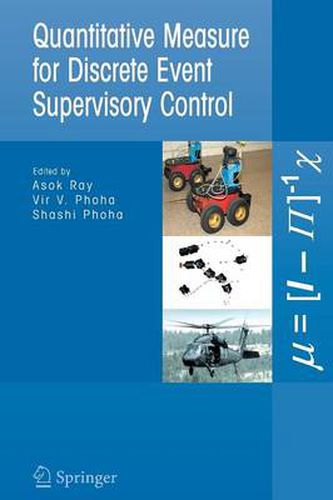Readings Newsletter
Become a Readings Member to make your shopping experience even easier.
Sign in or sign up for free!
You’re not far away from qualifying for FREE standard shipping within Australia
You’ve qualified for FREE standard shipping within Australia
The cart is loading…






This title is printed to order. This book may have been self-published. If so, we cannot guarantee the quality of the content. In the main most books will have gone through the editing process however some may not. We therefore suggest that you be aware of this before ordering this book. If in doubt check either the author or publisher’s details as we are unable to accept any returns unless they are faulty. Please contact us if you have any questions.
Supervisory Control Theory (SCT) provides a tool to model and control human-engineered complex systems, such as computer networks, World Wide Web, identification and spread of malicious executables, and command, control, communication, and information systems. Although there are some excellent monographs and books on SCT to control and diagnose discrete-event systems, there is a need for a research monograph that provides a coherent quantitative treatment of SCT theory for decision and control of complex systems. This new monograph will assimilate many new concepts that have been recently reported or are in the process of being reported in open literature. The major objectives here are to present a) a quantitative approach, supported by a formal theory, for discrete-event decision and control of human-engineered complex systems; and b) a set of applications to emerging technological areas such as control of software systems, malicious executables, and complex engineering systems. The monograph will provide the necessary background materials in automata theory and languages for supervisory control. It will introduce a new paradigm of language measure to quantitatively compare the performance of different automata models of a physical system. A novel feature of this approach is to generate discrete-event robust optimal decision and control algorithms for both military and commercial systems.
$9.00 standard shipping within Australia
FREE standard shipping within Australia for orders over $100.00
Express & International shipping calculated at checkout
This title is printed to order. This book may have been self-published. If so, we cannot guarantee the quality of the content. In the main most books will have gone through the editing process however some may not. We therefore suggest that you be aware of this before ordering this book. If in doubt check either the author or publisher’s details as we are unable to accept any returns unless they are faulty. Please contact us if you have any questions.
Supervisory Control Theory (SCT) provides a tool to model and control human-engineered complex systems, such as computer networks, World Wide Web, identification and spread of malicious executables, and command, control, communication, and information systems. Although there are some excellent monographs and books on SCT to control and diagnose discrete-event systems, there is a need for a research monograph that provides a coherent quantitative treatment of SCT theory for decision and control of complex systems. This new monograph will assimilate many new concepts that have been recently reported or are in the process of being reported in open literature. The major objectives here are to present a) a quantitative approach, supported by a formal theory, for discrete-event decision and control of human-engineered complex systems; and b) a set of applications to emerging technological areas such as control of software systems, malicious executables, and complex engineering systems. The monograph will provide the necessary background materials in automata theory and languages for supervisory control. It will introduce a new paradigm of language measure to quantitatively compare the performance of different automata models of a physical system. A novel feature of this approach is to generate discrete-event robust optimal decision and control algorithms for both military and commercial systems.